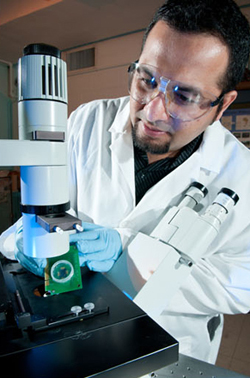 Argonne has recently begun a new program in safety known as the Observation Conversation. This is a technique where a supervisor and a staff person hold regular, informal conversations. These conversations should not center solely on the supervisor pointing out safety issues. It is intended to encompass all aspects of the work performed, from start-up and ordering of supplies to the expected end results. Since Argonne’s postdocs are in the thick of things in the laboratory it is inevitable that they will take part in an Observation Conversation if they have not already.
Argonne has recently begun a new program in safety known as the Observation Conversation. This is a technique where a supervisor and a staff person hold regular, informal conversations. These conversations should not center solely on the supervisor pointing out safety issues. It is intended to encompass all aspects of the work performed, from start-up and ordering of supplies to the expected end results. Since Argonne’s postdocs are in the thick of things in the laboratory it is inevitable that they will take part in an Observation Conversation if they have not already.
What is expected is that the supervisors will have the ability to have a more open dialogue with their staff and the lines of communication will be opened. It is hoped that, through these informal conversations, the supervisor and staff become more of a team in the quest to perform excellent research safely. Many issues have already been identified through these conversations. Some of these issues include difficulty with waste pickup, the need for better chairs for those who work at their desks all day and concerns regarding not knowing what work were being performed in an adjacent hood or glovebox.
By identifying these and other issues, it is believed that the work environment will become safer thus allowing the staff to focus more on the expected outcome of the work. Unfortunately we as humans cannot prevent every single mistake, nor should we. Many of science’s greatest discoveries have been accidents, such as penicillin and nylon. What we hope to accomplish is to identify those things that can hurt us and put up enough barriers to keep us safe in-case something unexpected happens. By having these informal conversations routinely throughout the work process, the thought process will then allow for more of the “what ifs” to occur and for more solutions to be discussed. This way supervisors and staff can plan and figure out what could go wrong, how to prevent it and if something does go wrong not to panic, but to address the issue and find resolution quickly and safely.

Sheri Sangi, UCLA Student
Protecting each other and ourselves in and outside of the laboratory is critical, especially in light of the 2008 death of UCLA student Sheri Sangji. Sheri was severely injured in a laboratory fire. In this incident, multiple things went wrong. Sheri was a 23-year-old part-time laboratory assistant who was working without supervision. She was performing dangerous work transferring tert-butylithium, a substance that can burst into flame spontaneously when exposed to air, into hexane, a flammable liquid.
Sheri was not wearing a laboratory coat or other personal protective equipment. The syringe came apart in her hands. The liquid sprayed onto her clothing and burst into flames. Unfortunately Sheri was wearing a synthetic, flammable sweater. The resulting flames caused second- and third-degree burns on more than 43 percent of her body. She died 18 days later in an intensive care unit.
Los Angeles County has formally charged her supervising professor and UCLA with multiple charges, ranging from “willful violation resulting in death” to “involuntary manslaughter.” Universities are now taking safety training seriously after this incident. We can hope that the systemic culture of laxity in safety will change at our nation’s higher institutions. Argonne wants to prevent accidents such as these by creating an environment where there is free flow of information, work progresses smoothly, and there are fewer situations where work has to be paused for unsafe conditions. That is why the laboratory has safety training, laboratory supervision and open dialogue and discussion. Since many of Argonne’s postdocs will go on to become supervisors one day, it is hoped that the Observation Conversation will travel with our postdocs and provide guidance on how to become more effective leaders and mentors for a lifetime.
Nancy VanWermeskerken (PSE) is an ALD ESH/QA representative. She holds a bachelor of science in biology and a master’s of science in analytical chemistry. She has worked 13 years as a scientist and 7 years exclusively in safety. At Argonne, she has performed work both in the laboratory and in the field. As a scientist, her focus was in organic analysis ranging from coal and petroleum to pesticides and PCBs to nonconventional weapons.

